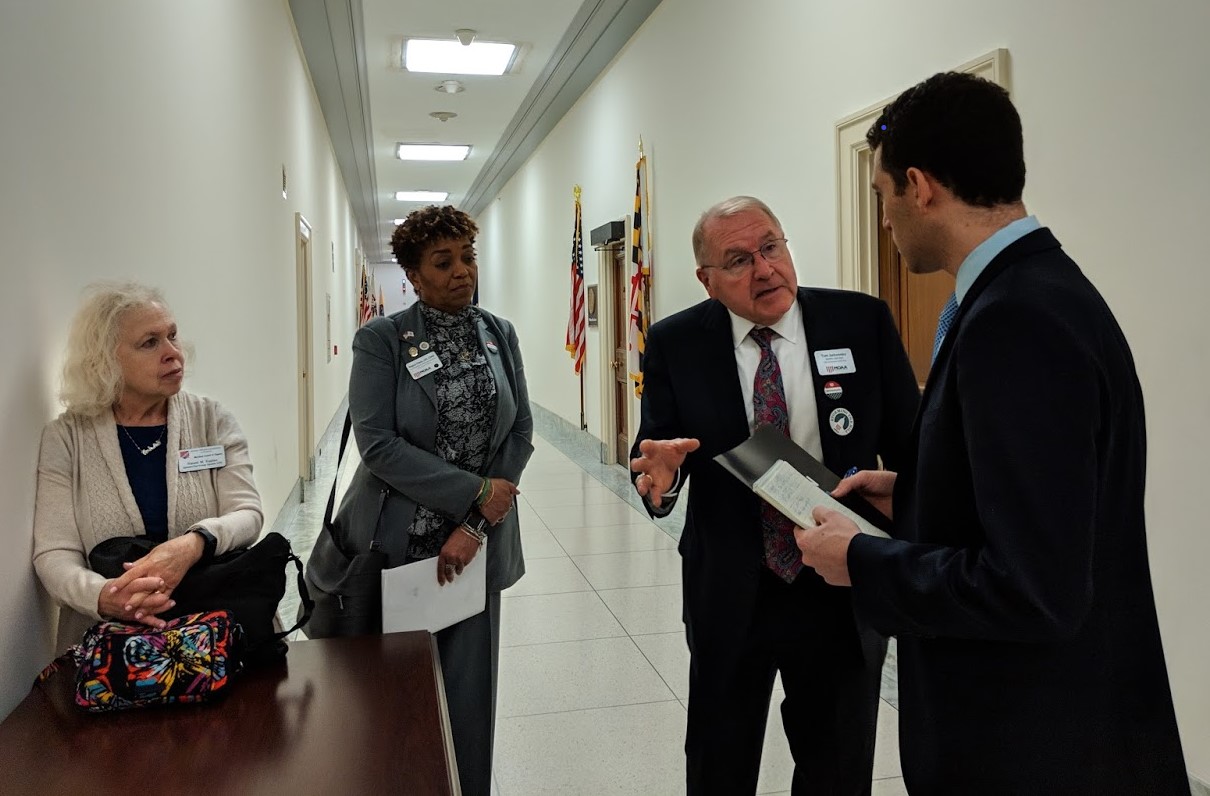This article originally appeared in the January 2020 issue of Military Officer, a magazine available to all MOAA Premium and Life members. Learn more about the magazine here; learn more about joining MOAA here.)
MOAA works hard to shape and advance policy in Washington, D.C., but the most effective voice in reaching members of Congress is yours, the constituent.
So how can you make sure your concerns are received by — and acted on — by legislators?
We examined traditional and newer ways of advocating for change on issues you care about, and we encourage you to explore all avenues to make sure your voice is heard in 2020 and beyond.
[RELATED: MOAA’s 6 Tips for Engaging Congress]
Face to Face
As you might expect, in-person visits from constituents are the most influential way to communicate with a senator or representative who is undecided on an issue, according to the Congressional Management Foundation, a nonpartisan nonprofit that works with Congress to improve operations and constituent engagement.
“You do better when you’re face to face,” says Rep. Phil Roe (R-Tenn.). “There’s an interaction. You see a person. You look into their eyes. You feel their needs. It’s different.”
The congressman said nothing beats an in-person conversation. His staff welcome members of the public to their district offices once a month, and any topic is fair game. And if you happen to see Roe at the local Walmart, he says you should chat him up.
“Some of your best ideas are from your constituents,” he says.
MOAA recognizes the importance of in-person advocacy. Each year, MOAA members from across the nation gather in Washington, D.C., for Storming the Hill. This allows individuals to meet with lawmakers and secure their support for legislation and policies that will benefit servicemembers past and present — and their families.
For instance, members of MOAA’s El Paso (Texas) Chapter met their congresswoman, Rep. Veronica Escobar (D-Texas), in person.
“Congresswoman Escobar addressed several priority MOAA issues and expressed support for the retention of the widows tax relief clause in the final version of the [National Defense Authorization Act] when the House and Senate meet in September to finalize the NDAA,” says El Paso Chapter President Col. Forrest Smith, USA (Ret). “I was impressed by her candor and willingness to entertain different perspectives on issues pertaining to veterans and active-duty military.”
Online
As effective as in-person advocacy is, it’s not always feasible or practical to visit Washington, D.C., every time you want to talk to a member of Congress about an important issue.
Consider sending an email instead. Sixty-five percent of congressional staffers said email is the most effective way to reach out to representatives, according to a study by Dr. David Rehr, professor and director of the Center for Business Civic Engagement at George Mason University.
Rehr’s study showed that congressional offices receive an average of 151 emails every day. If you’ve sent an email through the MOAA Take Action Center, you know that staffers respond to many of them on a regular basis.
It’s now easier and faster for citizens to communicate with Congress than it has ever been, says Roe. Email also allows the office to respond in a more timely manner.
Social Media
Take online communication a step further with social media — such as Facebook, Twitter, and Instagram. These sites have transformed constituents’ ability to interact with lawmakers.
A 2015 report from the Congressional Management Foundation (CMF) noted that more than 75% of congressional staffers felt that social media allowed for more meaningful constituent interactions, and 70% said it made members of Congress accountable to their constituents.
Social media “is affecting the democratic dialogue in unexpected ways,” says the report.
A tweet or social media comment alone might not get anyone’s attention, but if staffers are seeing repeat posts about the same issue, especially posts with comments and other discussion, it’s more likely to merit a response from a congressional staffer or get the attention of their boss.
As few as 10 comments could prompt attention from congressional offices, according to surveys conducted in 2014 by the CMF.
A timely social media campaign, especially at key moments in the legislative season, can garner a lot of attention and move the needle on an issue you care about.
Phone and Mail
If you’re not comfortable engaging Congress from your computer or mobile device, rest assured that you can still pick up the phone or write a letter to voice your concern.
Although regular mail is on the decline, Roe says it’s still valued. But mail is among the least effective ways to reach legislators, according to Rehr, the GMU professor.
Rep. Joe Wilson (R-S.C.) says phone calls are still important. An added bonus of this method is you can get instant feedback.
“I strive to be accountable and accessible to the community I represent,” he says. “I encourage those who need assistance to stop by or call one of our district offices or our Washington office.”
His office also operates on a policy that all means of contact get equal treatment, be it in person or via letter.
In one example from MOAA’s Summer Storm event, Capt. Kathleen Smith, USN (Ret), a member of the MOAA Uniformed Services Nurse Advocates Virtual Chapter, sent letters to Florida Sens. Marco Rubio and Rick Scott, describing how the widows tax has personally affected her.
“[My] husband, CWO4 David L. Smith, USN, Ret, died after 30 years of Naval Service. He received a 100% disability rating from the Navy and was receiving the VA disability payment,” Smith wrote. “At his death, my Survivor’s Disability Payment was reduced by $12,000 per year from the VA disability payment. That means I have lost approximately $383,000 over the last 32 years.”
‘A Measureable Impact’
Although the forms and methods are changing, advocacy remains essential to the political landscape.
With myriad options to reach legislators, the common denominator — and the most powerful tool — is your voice. Make sure to speak up in some way on important issues that affect you and other servicemembers and their families. Whether that’s increasing health care costs, benefits, or the widows tax, communicate frequently and with purpose.
“By diversifying their interactions, strengthening the quality of exchanges, and focusing on relationship building rather than transactional communications with Capitol Hill, constituents can have a measurable impact on decision-making in Congress,” says a CMF report on citizen-centric advocacy.
Legislative advocacy is often a years-long effort to advance an issue from obscurity into bills that must then undergo intense review before they can be passed through congressional committees and then through each of the House and Senate chambers. But sometimes, enough momentum builds to bring an issue to the foreground. None of this is possible without the efforts of individuals engaging with their congressional representatives.



